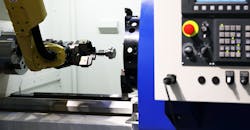Automation Is a Shop’s Competitive Advantage
Customers’ rising expectations, a widening labor gap, and supply-chain uncertainty mean that automation – which can provide a productivity advantage – is becoming increasingly essential for machine shops’ viability.
The rate at which machine shops have been adopting automation also means those businesses that remain behind the curve miss out on a potential competitive advantage. This is the reason that investing in automation is becoming essential for machine shops to remain successful.
Growing uncertainty. Modern machine shops contend with an increasingly acute shortage of skilled workers, making it difficult to keep up with demand. At the same time, supply chain disruptions, an economic crisis and the ongoing impact of COVID-19 have forced businesses to adapt rapidly.
Most machine shops face such uncertainties. The future availability of talent, customer demand, and a stable supply chain are not guaranteed, which makes it much more difficult to plan or invest in ways that may guarantee near-term success.
Being able to offer customers quick lead-time deliveries and reliable service is an advantage for machine shops. However, this will become even more valuable, and more attractive to potential clients as customer expectations rise and market conditions remain challenging.
How automation helps. Automated machinery and robotics adapted to workholding systems, precision machining centers, and pallet loaders, along with advanced CNC platforms, can help machine shops streamline their workflows, even when hiring additional workers impractical or impossible.
Such tools can also enable unattended or even lights-out operation, allowing the shop to continue producing parts when no worker is available to monitor a machine. Automating an entire shop is not likely to be practical, but often it’s possible to take advantage of those unstaffed hours using modern automation technology.
The right machine also can help extend a facility’s capabilities. A machine shop without equipment to simplify finishing or cleaning parts may want to invest in abrasive blasting, but cannot afford the labor required to operate that machine. An automation-ready abrasive blasting machine could provide that extended capability without requiring additional employees. Automation thus can improve shop throughput and reduce administrative workload, making it easier to meet growing customer demand.
Automating quoting and scheduling. It’s also possible to automate (fully or partially) many administrative and shop management tasks, like quoting and scheduling. Automated estimating processes take advantage of part file analysis, geometry-based pricing, and automated DFM checks to speed up estimates on new jobs. Quotes for individual components can be ready within minutes, and even highly complex parts may be available within hours.
These systems typically base their analyses on cost drivers like set-up count, process-specific features, and volume removal. This means they can provide an accurate quote for parts in most cases.
Automation also can speed up customer communications. Even if a part is particularly complex or unique, your shop can provide a quick turnaround on a quote for a customer.
Robotic process automation (RPA) tools can automate simple tasks that larger automation platforms are not built to handle — like data entry and basic data processing.
Machine programming automation can streamline work, too. Smaller uses of programming automation — like macros that move files or verify information — and more extensive machine processes can reduce significantly the amount of time needed for task set-up.
Many automation solutions also integrate shop machines with digital systems. If an owner is investing in or interested in Internet of Things (IoT) technology for shop management, automation platforms could help integrate these devices with their IoT network.
Essential automation strategies. Many shops begin integrating automation by targeting high-volume jobs or repetitive tasks that are easiest to automate. Machines that extend your machine shop, allowing you to complete assignments or perform work you could not do previously, may be good investments too.
Vetting machines or automation software before a purchase will help a shop to ensure each investment is the right one.
Many machine shops look for high-quality tooling magazines that will help maintain or increase set-up flexibility. High-capacity tooling equipment can make it possible for workers to set up everything at once for a job that calls for multiple sequences.
Effective automation also should fit into a machine shop’s long-term business goals. If your shop aims to implement lights-out precision machining in the near future, investing in software that allows for this now can help you to move toward that transition.
Machine shop owners should be aware of the consequences of machine shop automation — road bumps that may occur during or after integration and disrupt normal operations.
When integrating an automation solution, shops will need to pay careful attention to potential increases in task setup time. A new solution could simplify and speed up the job itself while increasing the amount of time needed to begin, reducing the productivity gains of the new technology.
Automation that enables machines to run more frequently or overnight may make machine management somewhat more complex. Equipment that runs overnight and unattended may call for more maintenance than units that only run less frequently or consistently. Parts collectors may need to be larger to handle the increased production volumes, especially if lights-out machining is the plan.
While automation is often simpler than it has been in the past, skilled programmers and operators will be needed to manage and maintain new robots and automated systems. Dedicating time and money to training will ensure you can integrate new technology smoothly and secure maximum productivity gains from a new machine.
Why so critical? Machine shops facing growing uncertainty and a widening labor gap may find investing in automation essential. New technology can streamline shop tasks, extend capabilities and simplify the quoting process without requiring additional labor.
Shops wishing to offer faster turnaround times and increase capacity for work should consider investing in or upgrading available automation technology.
Emily Newton is the Editor-in-Chief of Revolutionized, an online magazine exploring the latest industrial innovations.
About the Author
Emily Newton
Emily Newton is the Editor-in-Chief of Revolutionized, an online magazine exploring the latest industrial innovations.
